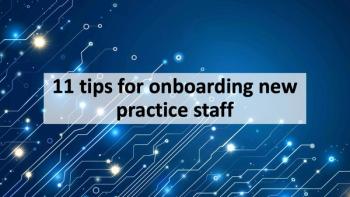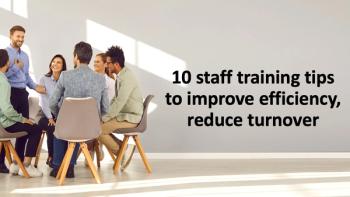
Is Monthly Staff Training Possible?
A practice consultant takes some time out to visit various practices, learning of communication gaps and training needs.
I did something yesterday that was long overdue. I stepped away from my computer and went to each of our clinic locations for a quick visit. I've recently hired a new employee, and I felt it was time that she was introduced to the staff that she communicates with via email and phone. Why is this so important? Face-to-face communication is your greatest asset when you're trying to problem solve or asking for feedback.
Here's how the day went:
First my new employee and I headed down to our southernmost office and spent time there doing introductions and making small talk. I asked the staff what they needed from me, and a whole list of requests started pouring out. It was a little surprising that they waited until someone asked instead of speaking up. The front office staff in that location are still relatively new, so I filed it away as such.
We stopped at the next location and had a similar experience. This location opened up in 2000, so I knew it wasn't a newbie kind of problem. I spoke with the clinical staff and answered some interesting questions, and a few complicated issues were worked out. I then spoke with the front office staff, and they had a whole different set of requests for my consideration.
Leaving there and sharing my thoughts with my newest staff member, I asked her about perceptions of the last two clinic encounters. Her words have never been truer. She said, "It seems like everyone is asking for more training. Not necessarily more meetings, just some serious content on how they can better perform and meet their goals." Boy, did she nail that one. I asked her to keep that thought as we visited the next three locations, and to write down her observations.
Much of the same happened in all of the remaining locations. I was seriously surprised.
We got back to our office and shared these observations and specific inquires with the rest of the staff. They agreed that perhaps quarterly training would help. With all of the changes in healthcare and insurance plans pulling out of the ACA, leaving patients scratching their heads, its clear our staff are looking for guidance in these areas.
The staff asked how they could better talk to patients about changes, and what they are supposed to do with a specific patient case when they keep changing plans. They asked how to approach patients who have out of network benefits, and we do not accept their plan. We even had a patient approach us asking about his bill he just received.
When I re-opened by computer for the day, there was a flurry of requests and thank you for stopping by type emails. It got me thinking about new ways that we can integrate learning at a staff member's own pace. Everyone has a different schedule, and trying to get all to the administrative or clinical staff in one room is harder than herding cats.
Technology seems to be the next best option. I think releasing a short training video, once a month should suffice. Each month the video will be on a topic that comes up based upon the questions we are being asked, and what changes are happening in healthcare for that month.
What are ways you keep your staff up to speed and in the loop? I'd love to know!
Newsletter
Optimize your practice with the Physicians Practice newsletter, offering management pearls, leadership tips, and business strategies tailored for practice administrators and physicians of any specialty.








